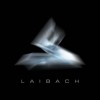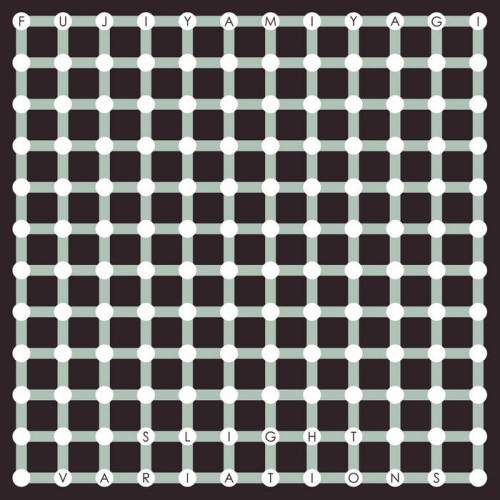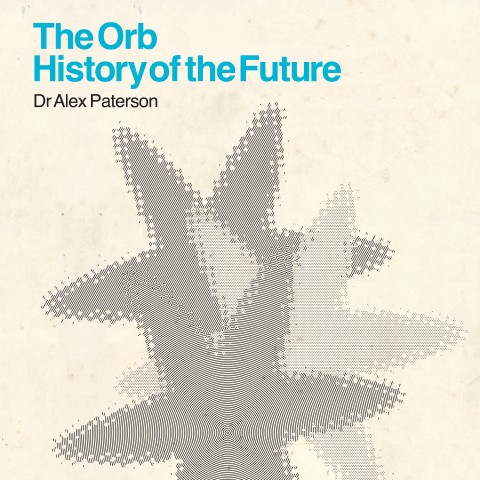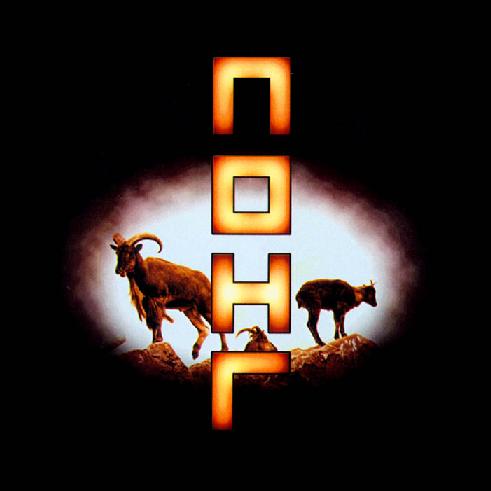 Approaching this new album by Laibach – their first proper in six or seven years – seems an awesomely intimidating task. I feel like the hominid leader Moonwatcher confronted by the sudden appearance of the Monolith in the opening ‘Dawn of Man’ sequence of Stanley Kubrick’s 2001: A Space Odyssey – approaching it nervously, touching it briefly and then scurrying away quickly to a safe distance in order to work up the courage to do it again.
Approaching this new album by Laibach – their first proper in six or seven years – seems an awesomely intimidating task. I feel like the hominid leader Moonwatcher confronted by the sudden appearance of the Monolith in the opening ‘Dawn of Man’ sequence of Stanley Kubrick’s 2001: A Space Odyssey – approaching it nervously, touching it briefly and then scurrying away quickly to a safe distance in order to work up the courage to do it again.
Deciding to dodge that particular haymaker, I will cravenly abdicate responsibility and quote instead from a man considerably sharper and smarter than your humble reviewer – the band’s fellow countryman, Slovenian philosopher, writer, thinker, psychoanalyst, film fan and all-round one man intellectual super-power, Slavoj Žižek:
The only way, I would even say, to be really subversive is not to develop critical potentials or ironic distance but precisely to take the system more seriously than it takes itself. And I think that this is maybe is one of the key’s to Laibach’s strategy.
For example, for the American public let’s recall a typical town in the south of the United States in the ‘20s. We have the official white law and order rule etc. On the other hand we have the nightly dark side of it, Ku Klux Klan, beating the blacks etc. Now my point is here double. First, the transgression – there is nothing subversive in the transgression of the system. This nightly suspension of the rule of the law and order – lynchings, beating of the blacks – are transgressions of the system, but transgressions that are an inherent part of the system. If you would ask an ideal subject of the United States, of the small southern town, “Where is your real identity?” “You can break the official public law, you will still be considered one of us. If you don’t solidarise with the beating of the blacks, with the Ku Klux Klan, you are excluded.”
So, in other words, not only does every system include its own inherent transgression, but identifying with this transgression – which must remain unspoken and concealed – is the real form of conformism. This transgression must remain hidden and unspoken. Of course, this goes for the United States. Here in so-called “real socialism”, we have other forms of these hidden transgressions.
And my point is that what Laibach is doing is precisely bringing to the light of the day this inherent transgression which, precisely in order for the system to reproduce itself, must remain hidden.
Predictions of Fire, 1996
Žižek is so clever. I wish he was my friend. Without in the slightest puncturing the dazzlingly obscurest mystique of the band, Žižek nonetheless goes below decks and opens a clear viewing window onto the engine room of the good ship Laibach – taking the system seriously in order to expose the hidden transgressions that lie at its heart. That system can be anything: communism, fascism, capitalism, consumerism, religion. All are fair game in the band’s quest, grist to the mill of their mission to (in their own words) “make evil lose its nerve;” all must be turned inside out, the hidden transgressions within exposed.
“No History” (itself a title loaded with implications) is truly a wolf in sheep’s clothing. Musically, it wouldn’t sound out of place being played on Friday night in a nightclub in Essex, somewhere with a name like Infinity or Liquid. Nagging and repetitive electronic hooks, overlaid with Mina Špiler‘s compressed vocals give the song the feel almost of handbag house, yet lyrically, though, it is as black as pitch, a world where there are is “No God, no rules to scare you all.” The narrator exhorts the masses to embrace a new political order wherein Wall Street should be occupied/Occupied, presenting a thumbnail sketch of a world cut adrift from values and morals. Even that might have gone unnoticed, except of course that is delivered in the voice of Milan Fras, the only man who can make The Young Gods‘ Franz Treichler sound like Jimmy Sommerville.
Next up is the pounding “Eat Liver!,” a call to deliver the revolution, punctuated by sampled strings swoops and clacking electronic percussion. Whether its incitement to consume the hepatic vital organ is metaphorical or literal, it hardly seems to matter. Probably both. “Americana” takes the fever pitch down a little, into the kind of muscular ambient electronica that The Young Gods have also explored with great profitability. Its message is no less confrontational though: “If you want to change the system, get out on the street, ‘cos if you don’t, you’ll hear a different beat.” Not many albums come close to necessitating the suspension of habeus corpus, but this one might – the state never likes this kind of seditious talk, especially given that, in view of the title, the state in question is a United one. The radio communications chatter, distant crowd noise and circling helicopters present in the track’s dying moments seem to suggest that some form of popular direct action has indeed taken place. Its political motivation, though, and still less its outcome, remain unknown – Battle of Matewan or Business Plot? “We are Millions and Millions are One” is more fragmentary, in every sense, but no less welcome for it. Having all the lyrical façade of a love song, it too nevertheless explores the darkness that lies in the heat of the night, with all potential – and all the potential horror – that lies there.
“Eurovision” is perhaps the album’s core, the dark pumping heart of Laibach in 2014. Coming on like Massive Attack in a bad mood, Fras lets rips a tortured growl over the state of Europe in which the crowds are beating the air and crying for freedom whilst “the ears are kept shut”. This is not the comforting Eurovision of Terry Wogan, laughing uncontrollably whilst Scandinavians openly cross-vote over some terrible “My Heart Goes Boom-Bang-A-Bang” pop monstrosity; this is the Eurovision of Greece’s Golden Dawn, surging to prominence in an era when economic austerity has reduced the nation that was the cradle of the developed world to a hoard of black-shirted bootboys out to kick in the heads of any nearby immigrants. “Europe is falling apart” comes the stark conclusion of the chorus. Does it then need der starker Mann – the strong man – to pull it together again? Quite frankly, this is terrifying stuff.
“Walk With Me” is another call to arms, one this time suffused with heavy bass beats and a deep sampled “ho ho ho” chorus that walks a fine line between comic and sinister (recalling something of the mad Robot Santa Claus from Futurama – “Your mistletoe is no match for my Tow Missile”) whilst the sonic landscape of “Bossanova”’s hammering rhythms allow Špiler and Fras free rein to examine the crushing of dreams and the stiffing of hope, where the machine of corporate neo-liberalism is painted as a monster of extraordinary and rapacious bloodlust, one that presidents and parliaments have no hope of controlling. Not perhaps the “new trend” that Antonio Carlos Jobim originally envisaged back in the more optimistic era in which he worked.The epic “Resistance Is Futile” is like some bizarre modern update of the “Monkees Theme,” a signature pop anthem for the band performing it. Yet instead of Davy Jones and the boys’ cheery rendering, its energetic burst of youthful ebullience telling the world that “we’ve got something to say,” Laibach’s hymn to blitzkrieg places them in the role of The Borg, assimilating all that lies in their path, erasing local identity and ruthlessly incorporating everything in their path into the collective mind. Here Laibach use themselves as metaphor, whether for Nazi expansion eastwards in the 1940s or for the irresistible steamroller of capitalism that carries on apace, and indeed unreformed, only five years after all swore that the system must be reformed because such an economic crisis could “never happen again.” The title’s parallel to the favourite yelling phrase of the young Vogon guard at the start of The Hitchhiker’s Guide to the Galaxy is really too delicious, and the spectacular booming ending confirms that, whether Fras and company are familiar with the work of Douglas Adams or not, this is indeed the music with which to soundtrack the demolition of Earth for make way for a new hyperspace bypass.
The album’s closing track, “Koran,” skirts dangerous territory by virtue of its title alone. In the post Osama bin Laden world where Samuel P Huntington’s Clash of Civilisations was quietened, if not resolved, by the change of focus away from the so-called War on Terror and towards economic austerity, the questions of the religious versus the secular remain, even if their most visible champion was dispatched by the barrel of a US Navy Seal’s gun.I believe in a better world
I believe in a better place
I believe in brotherhood, equality and freedom
I believe in happiness for all
Where the light is leading us, through the darkness of the night
There are questions I will follow.
And who could argue with that? Yet Fras’ first interjection, “Words are nice” seems to suggest that just paying lip service is not, these days, enough. Deeds not words is very much the aesthetic on offer here. “Koran” is a delicate and thought-provoking track, a gentle sunrise for a stormy night of an album.
So what does it all mean? Given how strongly situated Laibach seemed within the parameters of the Cold War when they first emerged during the dying days of ‘80s communism (in Yugoslavia, that most ambivalently ‘Soviet’ of all communist states), their original raison d’être could so easily have swiftly become overtaken by events, soon as dated as the sight of Leonid Brezhnev in a Zil limousine or Elton John sitting in his white open top Rolls Royce singing “Nikita” over Checkpoint Charlie at his obscure (female) East German border guard object of desire.
Yet Laibach’s mission was never one restricted only to the totalitarian polarities of communism and fascism. In an age in which both advanced capitalism and radical Islam claim to possess all the answers – the only answers – to building a better world, where the “people’s democratic flowering” of the Arab Spring quickly lead to a massive rise in gender oppression and new regimes as bad, or even worse, than those they supposedly “replaced,” where a European Union built on much trumpeted solidarity seems in fact to be predicated on little more than self-delusion and sharp practices in finance and spin, Laibach’s unique style of critique will always find a home.Spectre is a sledgehammer of an album, and using Žižek’s formulation that only when there are no more hidden transgressions to be exposed will Laibach’s mission be complete, it will certainly not be their last.
-David Solomons-



